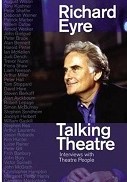| Five American Writers Talking Richard Eyre “Talking Theatre” Nick Hern Books |
Theatre Writer Book |
| Richard Eyre “Talking Theatre” , Nick Hern Books , December 10, 2009 |
 “Talking Theatre” comprises 42 interviews across the spectrum of theatre. That spectrum includes 15 writers. The birth years range from 1915 (Miller) to 1964 (Marber). Cumulatively they make for a rich spread.
“Talking Theatre” comprises 42 interviews across the spectrum of theatre. That spectrum includes 15 writers. The birth years range from 1915 (Miller) to 1964 (Marber). Cumulatively they make for a rich spread. He is also in the USA. The two interviewees from musical theatre have much the same to say on the relationship of song within the show. Eyre asks Arthur Laurents. “What is that gives the licence to a character to sing?” The answer is “You can make any character sing so long as that character has some passion. If they don't bleed, they don't sing.” “So the book always comes first?” asks Eyre. Laurents: “Must, must, must. The book gets all of the blame and none of the credit, but a good score cannot survive a bad book.” Sondheim reinforces the point “the book always comes first in this kind of musical. It has to be the story and the characters that propel both the song aspect and the need for song.” Every human is born into history in their own way. Arthur Miller is unequalled on the effect of the 1929 Crash. “It destroyed the idea that we had a system, an economic system. It showed that God had not created what we were living in. That it was not something that had sprung up with the forests and the rivers. And this mutability of everything was a shock. The disillusion was simply unbelievable. What it did was objectify everything. I began to see that everything was capable of destruction and was indeed on the verge of destruction. So it's basically a tragic view of existence: we live at the edge of a thread- you just shake that structure and it all comes apart.” Miller's personal history moves through the Federal Theatre Project, to Odets and the Group to McCarthyism. August Wilson, thirty years Miller's junior, had his first involvement in theatre in 1968. “It was the height of the Black Power movement”, he says “and the idea of theatre being able to communicate ideas is what attracted me to it originally. I started a community theatre in Pittsburgh.” Wilson's experience of schooling was miserable, the public library his salvation. Eyre inevitably asks as to the influences and the answer is distinctive. “The Blues, as I see that as the best literature that Black Americans have. And rooted inside the Blues is a whole philosophical system at work.” Wilson had no dramatic model when he started. “I just more or less forged ahead with my own sense of what the story should be, or what the play should be.” Eyre rightly distinguishes that the political is not the polemical. “That's not what I'm about” says Wilson. “I don't want to write a polemical play. I work as an artist and I have something I want to say as an artist. So for me the aesthetic statement is the most important important thing of the work.” Tony Kushner is 11 years younger again, Miller his first experience of theatre. “I remember the figure of Willy Loman, very, very powerfully.” His own sensibility reads the difference between Miller and Tennessee Williams. Sex in Miller is “really packed down and sort of fifties, square-jaw and clenched...whereas in Williams it's this absolutely inescapable, unavoidable life-force that's beating through everything.” Kushner's time in history was that of rampaging disease. “I was annihilated by the epidemic, by friends dying, and a politically grounded oppression with a biological disaster of these proportions.” Kushner is soaked in theatre context. “Theatre is inherently dialectical because the illusion/reality paradigm is unavoidable in theatrical experience.” He is awed by Caryl Churchill and looks back to O'Neill. “He was probably the loneliest playwright in American history.” He cites a letter of O'Neill's “where he writes about these vultures flying from their dark beyond and tormenting him endlessly, and he says now at the end of my life they've given me an exchange for all of this torment, some small germ of a soul.” Richard Eyre's interviews across the Atlantic are riveting. |
Reviewed by: Adam Somerset |
This review has been read 1335 times There are 34 other reviews of productions with this title in our database:
|
